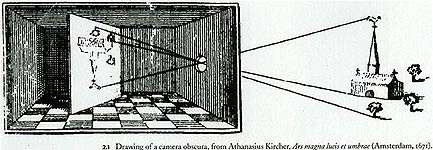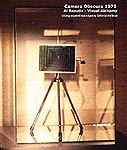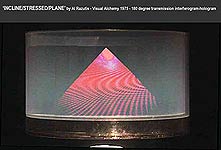Plato's Cave and the Marvelous in Waiting
by Al Razutis (2002, 2010)
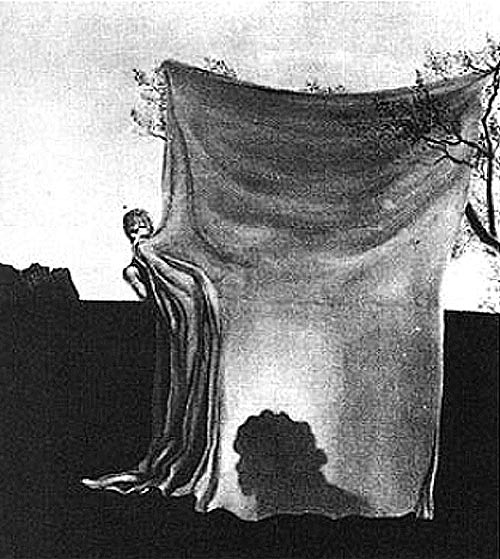
Dali and the phantoms that are of another place.
Plato's Cave - Introductions with pinholes, holograms and words
|
|
|
|
Virtual and Projected Realities
Much has been written about the 'Virtual Window', the primitive 'Camera Obscura" imaging system (from the Middle Ages, if not from the Greeks), and its 'upside down' ideologies (Marx), and its subjectivities (Lacan). Always, the students of the arts, the philosophers and historians of arts and culture, the painters, media artists, curators are told that the evolution of imaging systems are derived from such 'camera obscuras', that Rennaisance perspective was 'all about this', that 'windows', 'virtual reality' and all forms of networked projection systems are beholden to this camera obscura and that we all should 'know' this, reference this, or be excluded from 'modernity' and its arts and cultures.
The theories of 'windows', 'apertures', and the 'virtual' have rarely taken into account taken account the 'projected real' in alchemy, art, and technologies of the 'real' as imagined or made. If one reads 'The Virtual Window' (Anne Friedberg, 2006) or the extraordinary 'Deep Time of the Media' (Siegfried Zielinski, 2006), there will be mentions of 'virtual reality' but little or no mention of 'holographic reality', 'alchemical reality' or the 'projected real'. And even more surprising, there is little mention of 'stereoscopic 3D reality', even though this imaging process is all the 'rage' in this decade.
(Stereoscopic and holographic '3D' connections and theoretical relations are found in the essay by Razutis: 'Projecting - Alchemy'.)
The allegory of Plato's CaveImagine prisoners who have been chained since childhood deep inside a cave. Not only are their limbs immobilized by the chains, their heads are as well so that their eyes are fixed on a wall. Behind the prisoners is an enormous fire, and between the fire and the prisoners there is a raised way, along which men carry shapes of various animals, plants, and other things. The shapes cast shadows on the wall, which occupy the prisoners' attention. Also, when one of the shape-carriers speaks, an echo against the wall causes the prisoners to believe that the words come from the shadows. The prisoners engage in what appears to us to be a game naming the shapes as they come by. This, however, is the only reality that they know, even though they are seeing merely shadows of images. Suppose a prisoner is released and compelled to stand up and turn around. His eyes will be blinded by the firelight, and the shapes passing will appear less real than their shadows. Similarly, if he is dragged up out of the cave into the sunlight, his eyes will be so blinded that he will not be able to see anything. At first, he will be able to see darker shapes such as shadows, and only later brighter and brighter objects. The last object he would be able to see is the sun, which, in time, he would learn to see as that this it is that provides the seasons and the courses of the year and presides over all things in the visible region, and is in some sort the cause of all these things that they had seen. (The Republic bk. VII, 516b-c; trans. Paul Shorey) This part of the allegory, incidentally, closely matches Plato's metaphor of the sun which occurs near the end of The Republic Book VI. Once thus enlightened, so to speak, the freed prisoner would no doubt want to return to the cave to free "his fellow bondsmen". The problem however is that they would not want to be freed: descending back into the cave would require that the freed prisoner's eyes adjust again, and for a time, he would be inferior at the ludicrous process of identifying shapes on the wall. This would make his fellow prisoners murderous toward anyone who attempted to free them. http://en.wikipedia.org/wiki/Plato's_allegory_of_the_cave
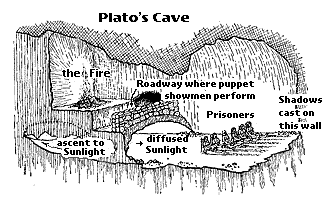
|
'PLATO'S CAVE' Excerpt from Book VII of Plato's Republicfrom http://www.vrc.iastate.edu/why.html "Next, then," I said. "make an image of our nature in its education and want of education, likening it to a condition of the following kind. See human beings as though they were in an underground cave-like dwelling with its entrance, a long one, open to the light across the whole width of the cave. They are in it from childhood with their legs and necks in bonds so that they are fixed, seeing only in front of them, unable because of the bond to turn their heads all the way around. Their light is from a fire burning far above and behind them. Between the fire and the prisoners there is a road above, along which we see a wall. built like the partitions puppet-handlers set in front of the human beings and over which they show the puppets". "I see," he said. "Then also see along this wall human beings carrying all sorts of artifacts, which project above the wall, and statues of men and other animals wrought from stone, wood, and every kind of material; as is to be expected, some of the carriers utter sound while others are silent." "It's a strange image," he said, "and strange prisoners you're telling of." "They're like us," I said. "For in the first place, do you suppose such men would have seen anything of themselves and one another other than the shadows cast by the fire on the side of the cave facing them?" "How could they," he said, "if they had been compelled to keep their heads motionless throughout life?" "And what about the things that are carried by? Isn't it the same with them?" "Of course." "If they were able to discuss things with one another don't you believe they would hold that they are naming these things going by before them that they see?" "Necessarily." "And what if the prison also had an echo from the side facing them? Whenever one of the men passing by happens to utter a sound, do you suppose they would believe that anything other than the passing shadow was uttering the sound?" "No, by Zeus," he said. "I don't." "Then most certainly," I said, "such men would hold that the truth is nothing other than the shadows of artificial things." "Most necessarily," he said. "Now consider," I said, "what their release and healing from bonds and folly would be like if something of this sort were by nature to happen to them. Take a man who is released and suddenly compelled to stand up, to turn his neck around, to walk and look up toward the light; and who, moreover, in doing all this is in pain and, because he is dazzled, is unable to make out those things whose shadows he was before. What do you suppose he'd say if someone were to tell him that before he saw silly nothings, while now, because he is somewhat nearer to what IS and more turned toward beings, he sees more correctly; and, in particular, showing him each of the things that pass by, were to compel the man to answer his questions about what they are? Don't you suppose he'd be at a loss and believe that what was seen before is truer than what is now shown?" "Yes," he said, "by far." "And if he compelled him to look at the light itself, would his eyes hurt and would he flee, turning away to those things that he is able to make out and hold them to be really clearer than what is being shown?" "So he would," he said. "And if," I said, "some one dragged him away from there by force along the rough, steep, upward way and didn't let him go before he had dragged him out into the light of the sun, wouldn't he be distressed and annoyed at being so dragged? And when he came to the light, wouldn't he have his eyes full of its beam and be unable to see even one of the things now said to be true?" "No, he wouldn't," he said, "at least not right away." "Then I supposed he'd have to get accustomed, if he were going to see what's up above. At first he'd most easily make out the shadows; and after that the phantoms of the human beings and the other things in water; and, later, the things themselves. And from there he could turn to beholding the things in heaven and heaven itself, more easily at night, looking at the light of the stars and the moon, than by day, looking at the sun and sunlight." "Of course." ... ... "Now reflect on this too," I said. "If such a man were to come down again and sit in the same seat, on coming suddenly from the sun would his eyes get infected with darkness?" "Very much so," he said. "And if he once more had to compete with those perpetual prisoners in forming judgments about those shadows while his vision was still dim, before his eyes had recovered, and if the time needed for getting accustomed were not at all short, wouldn't he be the source of laughter, and wouldn't it be said of him that he went up and came back with his eyes corrupted, and that it's not even worth trying to go up? And if they were somehow able to get their hands on and kill the man who attempts to release and lead up, wouldn't they kill him?" From: "The Republic of Plato" translated with notes and an interpretive essay by Allan Bloom. Published by Basic Books Inc., New York, London in 1968. Before the marvelous can be apprehended, let's get this straight: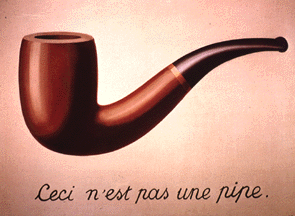
"Betrayal of Images" by Rene Magritte. 1929 painting on which is written "This is not a Pipe" (Texts selected by Al Razutis - 2004) Beyond caves - projections and desire: 'Projecting - Alchemy' Collected Essays on Alchemy and Surrealism on this site: Alchemy - Surrealism A cool place to visit on FaceBook: 'Surreality' by Al Razutis |
